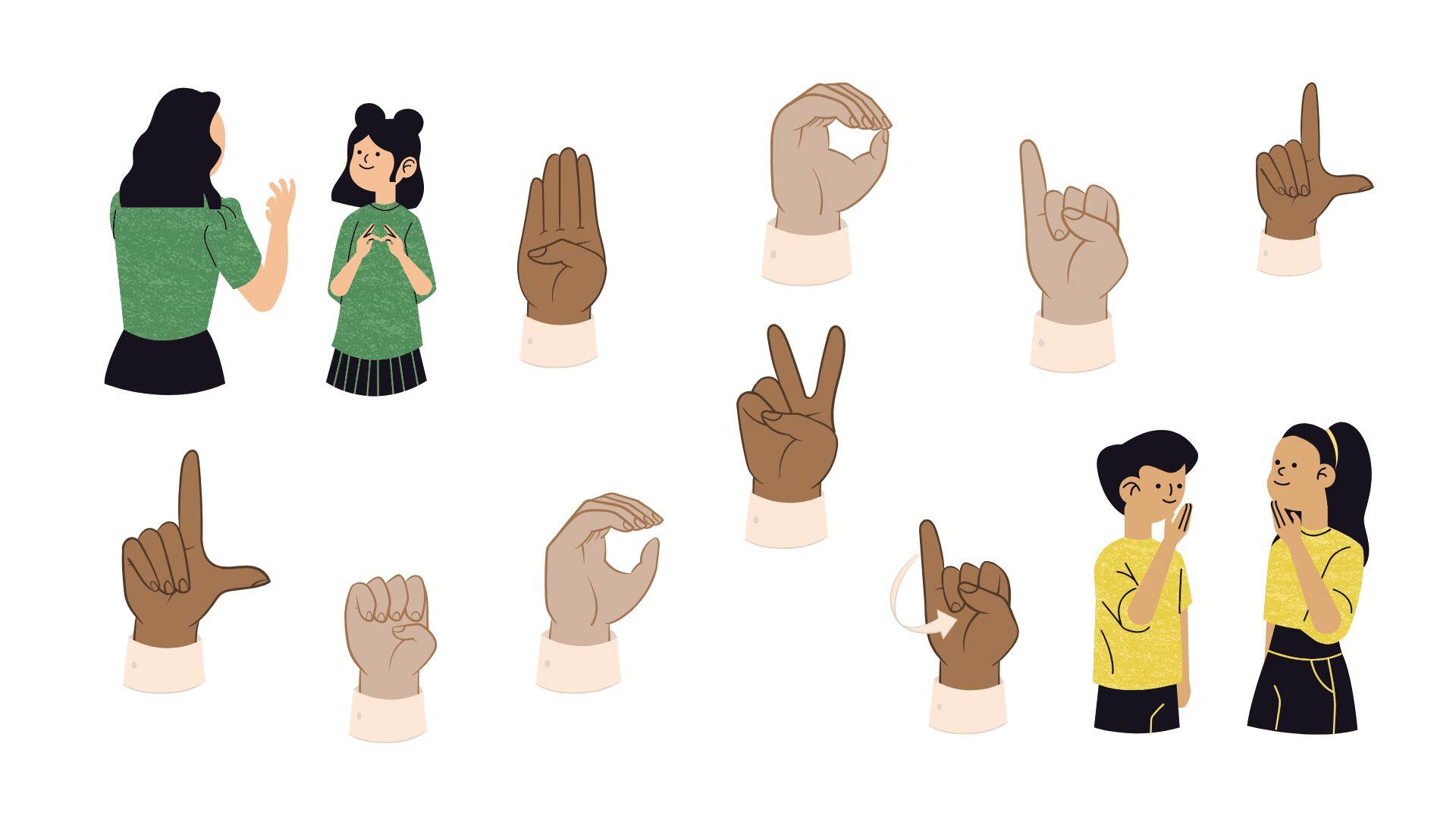Becoming a certified Indian Sign Language (ISL) teacher offers a uniquely rewarding career path for individuals passionate about communication, education, and empowering the deaf community. It's a profession that goes beyond simply knowing a language; it requires a deep understanding of deaf culture, effective pedagogical skills, and a genuine commitment to fostering inclusivity. ISL teachers play a crucial role in bridging communication gaps, opening up educational opportunities, and advocating for the rights and well-being of deaf individuals. This article delves into the essential qualifications needed to become a certified ISL teacher in India, including the necessary certifications, educational background, and crucial skills, while also providing insights into the salary expectations for this profession.
The demand for qualified Indian Sign Language teachers is steadily growing as awareness of deaf culture and the importance of inclusive education increases. This career path offers not only the satisfaction of making a tangible difference in people's lives but also the opportunity to be part of a vibrant and dynamic community. It is a profession that calls for dedication, patience, and a genuine love for language and learning. This article aims to provide a comprehensive guide for those considering a career in ISL education, outlining the steps needed to achieve certification and embark on this fulfilling journey. It will also shed light on the significance of Indian sign language itself and its vital role within the deaf community.


Understanding the Landscape of Indian Sign Language
Indian Sign Language (ISL) is the primary language used by the deaf community in India. It's not simply a manual representation of spoken Hindi or English; instead, it's a fully developed, independent language with its own grammar, syntax, and vocabulary, distinct from any spoken language. ISL has evolved organically within the deaf community over generations, reflecting the rich cultural heritage and unique experiences of deaf individuals in India. It's a vibrant and dynamic language, constantly evolving and adapting to the changing needs of its users. Understanding the nuances of ISL is crucial for anyone working with the deaf community, especially aspiring ISL teachers.
ISL plays a vital role in the lives of deaf individuals, providing them with a means of communication, self-expression, and access to information. It is the language of their community, their culture, and their identity. Recognizing and promoting ISL is essential for fostering inclusivity and ensuring that deaf individuals have equal opportunities in education, employment, and social participation. It is a fundamental human right for deaf individuals to have access to education and information in their own language.
Several factors contribute to the diversity within ISL. Regional variations exist, similar to dialects in spoken languages. While there is a core vocabulary and grammar that is widely understood, regional signs and variations in expression can be found across different parts of India. This linguistic diversity further enriches the landscape of ISL. Understanding these regional variations is an essential consideration for ISL teachers, mainly when working with students from diverse backgrounds.
Key aspects of ISL to consider:
- Distinct Grammar: ISL has its own grammatical rules that are different from those of spoken languages.
- Unique Vocabulary: Many signs in ISL have no direct equivalent in spoken languages.
- Visual-Spatial Language: ISL utilizes visual and spatial cues, including handshapes, movements, facial expressions, and body language.
- Cultural Significance: ISL is deeply intertwined with deaf culture and identity.
- Regional Variations: Different regions of India may have variations in signs and usage.
Qualifications of a Sign Language Teacher: Building a Strong Foundation
The qualifications of a sign language teacher extend far beyond simply knowing Indian Sign Language (ISL). While fluency in ISL is undoubtedly the cornerstone, a successful and effective ISL teacher possesses a multifaceted skill set that encompasses linguistic proficiency, cultural sensitivity, pedagogical expertise, and a genuine passion for fostering communication and learning within the deaf community. Building a strong foundation requires a commitment to continuous learning and professional development.
Fluency in Indian Sign Language
Exceptional command of ISL is the most fundamental qualification. This includes both expressive skills (signing clearly and accurately) and receptive skills (understanding signed communication). A prospective teacher must demonstrate a deep understanding of ISL grammar, syntax, and vocabulary, including regional variations. Fluency goes beyond basic conversational skills; it requires the ability to engage in complex discussions, explain abstract concepts, and adapt communication styles to different audiences. Regular interaction with the deaf community is essential for maintaining and improving ISL fluency.
Formal Education and Training
Formal training in sign language interpretation or teaching is highly recommended. Several institutions across India offer diplomas, bachelor's degrees, and master's degrees in sign language, deaf studies, or related fields. These programs provide a structured learning environment where aspiring teachers gain a comprehensive understanding of ISL linguistics, deaf culture, teaching methodologies, and ethical considerations. They also offer valuable opportunities for practical experience through internships and practicums. A strong academic background provides a solid theoretical foundation for effective teaching.

Certifications to Become an Indian Sign Language Teacher
Obtaining relevant certifications demonstrates a commitment to professional standards and enhances credibility. While a standardized national certification system for ISL teachers is still evolving, several organizations offer certifications or accreditations. These certifications often assess sign language proficiency, teaching skills, and knowledge of deaf culture. Researching and obtaining these certifications is a significant step towards becoming a recognized ISL teacher. These certifications can significantly impact career prospects and demonstrate a commitment to professional excellence.
Understanding Deaf Culture and Community
Effective communication goes beyond linguistic proficiency. A qualified sign language teacher must possess a deep understanding of deaf culture, including its values, norms, social dynamics, and history. Cultural sensitivity is crucial for creating an inclusive and respectful learning environment. Teachers should be aware of the unique challenges and experiences faced by deaf individuals and be able to advocate for their needs. Building strong relationships with the deaf community is essential for fostering trust and collaboration.
Pedagogical Skills
Teaching sign language effectively requires strong pedagogical skills. Teachers should be able to adapt their teaching methods to suit different learning styles, create engaging and interactive lessons, and assess student progress effectively. Knowledge of language acquisition principles, curriculum development, and classroom management techniques is essential. ISL teachers should also be familiar with the use of visual aids, technology, and other resources to enhance learning.
Communication and Interpersonal Skills
Excellent communication and interpersonal skills are vital for interacting with students, parents, colleagues, and other stakeholders. Patience, empathy, and the ability to build rapport are essential qualities for a sign language teacher. Teachers should be able to communicate effectively with individuals who have varying levels of sign language proficiency and be able to explain complex concepts in a clear and accessible manner.
Continuing Education
The field of sign language and deaf education is constantly evolving. A qualified sign language teacher should be committed to ongoing professional development, including staying updated on new research, attending workshops and conferences, and engaging with the deaf community. Continuing education ensures that teachers remain effective, knowledgeable, and culturally competent. It also allows them to stay abreast of new developments in ISL linguistics, teaching methodologies, and assistive technology.

Salary of a Sign Language Teacher in India
The salary of a sign language teacher in India can vary significantly based on several factors, including experience, qualifications, location, the type of institution, and the current demand for qualified professionals. While precise figures can fluctuate, understanding the general salary landscape is important for those considering this career path. Experience plays a significant role, with entry-level teachers typically earning less than those with several years of experience. Higher educational qualifications, such as a master's degree in sign language or deaf studies, along with relevant certifications, can positively influence earning potential.

Geographic location also plays a role. Salaries in major metropolitan areas may be higher compared to smaller towns or rural areas due to the cost of living and demand. The type of institution where a teacher is employed can also impact salary. Schools for the deaf, mainstream schools, colleges, universities, and private language centers may offer different salary scales. Finally, the demand for qualified ISL teachers, which is currently on the rise, can influence salary negotiations. While financial compensation is important, many ISL teachers are drawn to the profession by the intrinsic rewards of making a difference in the lives of deaf individuals.
Estimated Salary Ranges for ISL Teachers in India (Approximate):
| Experience Level | Estimated Monthly Salary (INR) |
|---|---|
| Entry-Level (0-2 years) | ₹15,000 - ₹25,000 |
| Mid-Level (3-5 years) | ₹25,000 - ₹40,000 |
| Experienced (5+ years) | ₹40,000 - ₹70,000+ |
Note: These figures are approximate and can vary widely based on the factors mentioned above. Researching current salary trends and negotiating based on your specific qualifications and experience are always recommended.
Career Opportunities for Certified ISL Teachers
Certified Indian Sign Language (ISL) teachers are in increasing demand across various sectors in India. Their expertise is crucial for fostering inclusivity and accessibility for the deaf community in education, communication, and other areas. Here's a breakdown of potential career paths:
Educational Institutions
- Schools for the Deaf: These schools require qualified ISL teachers to provide instruction in various subjects, using ISL as the primary language of communication.
- Mainstream Inclusive Schools: With the growing emphasis on inclusive education, mainstream schools are increasingly hiring ISL teachers to support deaf students integrated into regular classrooms. These teachers may provide instruction in ISL, interpret spoken language, and advocate for the needs of deaf students.
- Colleges and Universities: Some institutions offer ISL courses as part of their language programs or deaf studies departments, requiring qualified instructors to teach ISL and deaf culture.
Community and Social Services
- Deaf Community Centers: Community centers serving the deaf community may employ ISL teachers to offer classes, workshops, and support services to deaf individuals and their families.
- NGOs and Social Organizations: Organizations working with deaf individuals often require ISL expertise for communication, advocacy, and program development.
Other Opportunities
- Private Tutoring: Some ISL teachers choose to work independently, offering private lessons or tutoring to individuals who want to learn ISL.
- Interpreter Training Programs: Experienced ISL teachers may work in interpreter training programs to prepare future sign language interpreters.
- Corporate and Government Settings: As awareness of accessibility increases, some corporations and government agencies are recognizing the need for ISL interpreters and trainers.

Empowering Through Indian Sign Language: A Rewarding and Impactful Career
Becoming a certified Indian Sign Language teacher is more than just a job; it's a calling. It's an opportunity to empower the deaf community, promote inclusivity, and bridge communication gaps. By acquiring the necessary qualifications, including fluency in ISL, formal education, relevant certifications, and a deep understanding of deaf culture, individuals can make a profound difference in the lives of deaf individuals. ISL teachers play a vital role in facilitating access to education, information, and social participation, fostering a sense of belonging and empowerment within the deaf community. The dedication and passion required for this profession are often rewarded by the immense satisfaction of witnessing students thrive and achieve their full potential.
The demand for qualified ISL teachers is steadily growing, making it a promising career path for those passionate about sign language, education, and social justice. As awareness of deaf culture and the importance of inclusive education increases, the need for skilled ISL teachers will continue to rise. This career offers not only the opportunity to make a tangible difference in the lives of others but also the chance to be part of a vibrant and dynamic community. If you are passionate about communication, education, and empowering others, a career as a certified Indian Sign Language teacher may be the perfect path for you.
Summarise with AI:















